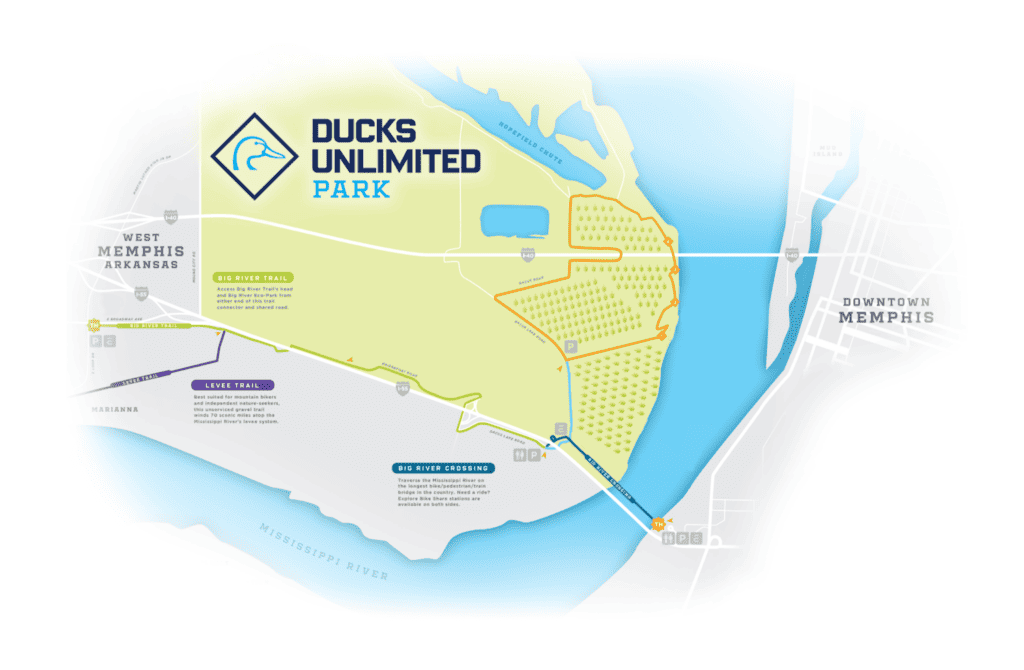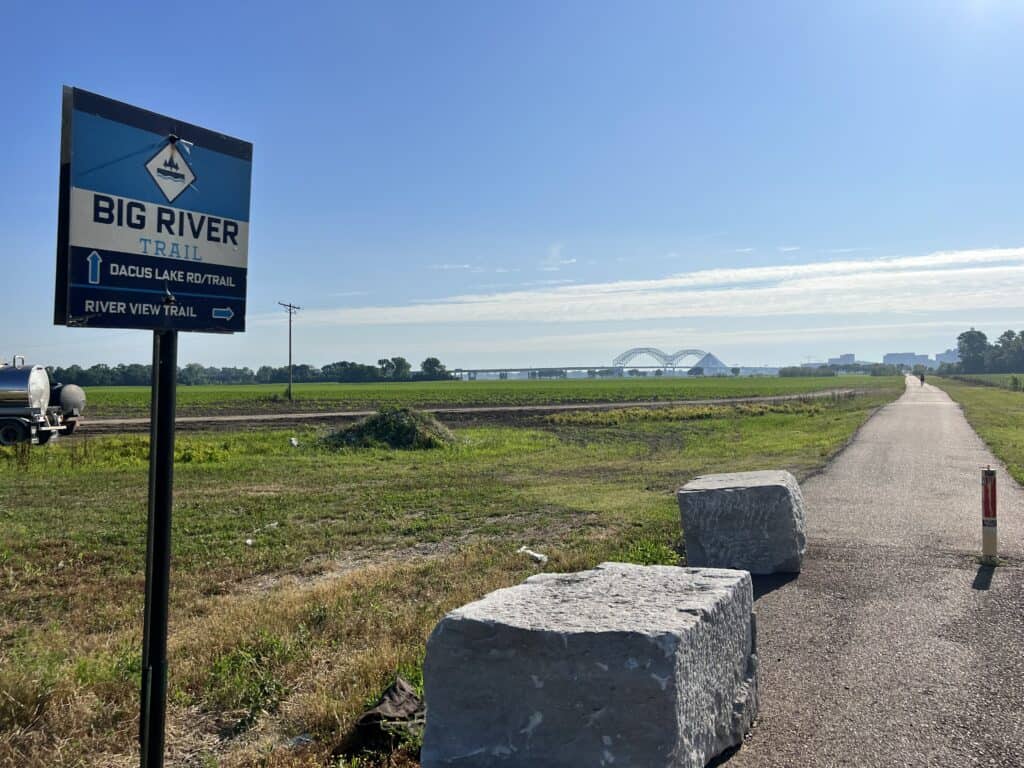Big River Crossing, the scenic pedestrian bridge adjacent to the Harahan Bridge, opened to much excitement in 2016, providing an almost one-mile span for walkers across the Mississippi, with novel views of the river and the Memphis skyline. But some might have wondered, “Is that it, do we just turn around?” Those looking for more trails or a destination after crossing into Arkansas will have a new park to visit, Ducks Unlimited Park, nestled to the north on the shore of the Mississippi, a work in progress.
Unlike Shelby Farms Park, an urban park about 14 miles from downtown, the primary goal of Ducks Unlimited Park is restoration of the wetlands back to its natural state: bottomland hardwoods and bald cypress swamp. According to the EPA, bottomland forests— forested wetlands that can survive in areas that are seasonally flooded—covered almost 30 million acres of the southeastern United States 200 years ago, but a majority of this land was lost to farming, with only 40% remaining today. With the eventual restoration project of the park, many acres of the 1500 total will be restored to their natural state to help better control our floodplain and improve water quality by filtering pollutants and reducing sediment before the water returns to the Mississippi. Alongside the restored wetlands, the remaining acreage will provide recreational and educational benefits to park visitors.
Chris Ware, executive director of Ducks Unlimited Park, says the idea for the park developed after realizing that 250,000 people crossed the Harahan Bridge the first year it was open. Now that total is 1.5 million and counting: the fan base was ready and interest was apparent. But a park on the Arkansas side didn’t become a reality until the group was fortunate enough to make deals with some of the very willing landowners who also shared in the new vision for the area.
Ware says, “We were lucky that the majority of the landowners were from the area or were Memphians, so they understood the benefit and impact that can happen with wild trails and spaces for the city to expand a bit recreationally.” Over several years, several million dollars for land acquisition was secured and land deals were negotiated that were beneficial to all.

Tenn Green, a Nashville land conservation organization, stepped up as the first key stakeholder to buy several parcels and start the process of land acquisition for the park. Then when the Big River Crossing group established that the goal would be wetlands restoration, they reached out to Ducks Unlimited (with a national headquarters in Memphis), which has an extensive wetlands restoration background, to discuss a partnership. Ducks Unlimited was excited by the prospect and was interested in coming on board—at first as technical assistance, but they quickly realized the potential for the area and expressed interest in contributing in bigger ways.
Ducks Unlimited CEO Adam Putnam and several other local board members saw the possibility to show the public their expertise in wetlands restoration work they conduct all over North America. Here was the opportunity, right in their own backyard, to have a footprint and legacy in the Memphis area, in addition to having a campus here. Ware says that since Ducks Unlimited has been involved, park development has taken off and gone from something that might happen to something that is going to happen: “This park is a reality now. Ducks Unlimited has been instrumental in lining up donors and fundraising partners, fundraising at a corporate level and individual donor level.” He says they have been great partners, including their field resource office in Jackson, Mississippi, which employs well- trained scientists and engineers that know exactly how to bring property back from agricultural use. Ducks Unlimited will be leading the charge when it comes to the restoration, not just from aesthetic point of view, but also determining what area will flood every year and which plants are needed to transition the existing fields to hardwood bottomland, meadows, and swamp for the long term.
Currently, Ducks Unlimited Park is in the final stages of completing a park master plan with Richie Smith Associates, a Memphis landscape architecture firm experienced with local parks and parks all along the Mississippi. Ware expects a final edited version to the master plan later this summer and then they will compare and contrast costs and fundraising expectations. Fundraising will be ongoing over the next year or two.
Groundbreaking for the first of several amenities is planned for Fall 2023. Ideas include a welcome center, low impact meandering trails with an elevated boardwalk that connects to an outdoor classroom and hardwood swamps, a retriever training area, and an off-leash dog park. The ultimate goal will be a raised pavilion at the corner of Dacus Lake Road near the I-40 Bridge that will look back toward Memphis. The mound itself will be several hundred yards wide, an elevated open air pavilion with a sunflower meadow out front and multiple staggered seating areas on the mound area facing the river. This summer some flowers will again be planted that will bloom in July and early August.
The almost six-mile trail through the park, once gravel, is now paved and swings to a viewing area near the river. Shade awnings are planned for this trail. There is also a connection to Big River Levee Trail, which is currently part of a gravel 76-mile trail system that connects the levees from Marion, TN to Marianna, AR, and will eventually be part of a 1,607-mile levee trail that connects from the Mississippi to the headwaters of the Gulf of Mexico.

Entering this park, Ware says, will be a different experience. “When you step over there, that land that’s in-between the levees over the last 100 years has really created its own ecosystem. There’s much more biodiversity in that little area than there is basically within 100 miles of here. That’s the way it is with the entire Mississippi levee. There’s different trees, different fauna, different bird species that stay on the property there, different insects.” Ducks Unlimited Park will complement Memphis River Parks Partnership, the Shelby Farms Park Conservancy, and other Memphis green spaces.
More green space here will also help to attract corporations, Ware hopes. He explains that Tennessee has many advantages for corporations to relocate here and this park will be another reason for them to prefer Memphis over Nashville and Chattanooga, in addition to encouraging the wonderful people who are growing up here to choose Memphis, and for those of us who live here to enjoy it. Ware says the city of Memphis has been supportive of the park and he notes that Tom Lee Park and Ducks Unlimited Park will literally and figuratively connect by way of the bridge– one park will be extended to the other.
“Coming out of the pandemic, any small business owner will tell you that quality of life was important before, but that factor has gone through the roof. We recognize that, the city recognizes that, Arkansas recognizes that, and I think that’s why a lot of major corporations are willing to step up. We hope to be just one of the many parts of a bigger partnership project that extends this kind of habitat restoration up and down the river all the way down to New Orleans. There is actually a lot that could be done without very much effort.” A green, sustainable investment in the future of Memphis: this is a reason for Memphians to keep walking across the Big River.



